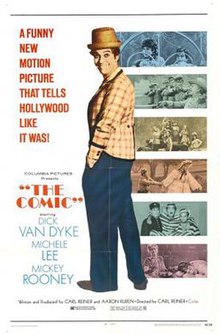The Comic
| The Comic | |
|---|---|

theatrical poster
|
|
| Directed by | Carl Reiner |
| Produced by | Carl Reiner Aaron Ruben |
| Written by | Carl Reiner Aaron Ruben |
| Starring |
Dick Van Dyke Mickey Rooney Michele Lee |
| Narrated by | Dick Van Dyke |
| Music by | Jack Elliott |
| Cinematography | W. Wallace Kelley |
| Edited by | Adrienne Fazan |
|
Production
company |
|
|
Release date
|
|
|
Running time
|
94 minutes |
| Country | United States |
| Language | English |
The Comic is a 1969 Pathécolor comedy film co-written, co-produced, and directed by Carl Reiner. It stars Dick Van Dyke as Billy Bright (which was the original title of the film), Michele Lee as Bright's love interest, and Reiner himself and Mickey Rooney as Bright's friends and work colleagues. Reiner wrote the screenplay with Aaron Ruben; it was inspired by the end of silent film era, and, in part, by the life of silent film superstar Buster Keaton.
Billy Bright (Dick Van Dyke), a silent-era film comedian, narrates this film which begins at his character's funeral in 1969 and tells his life story in flashbacks, unable to see his own faults and morosely (and incorrectly) blaming others for anything that has gone wrong.
Headstrong and talented, vaudeville clown Bright arrives on his first California film location insisting that he will perform his bit role only if he can wear the outrageous costume and makeup of the character he has been known for on the stage. The director (Cornel Wilde) refuses and Bright begins to storm off, but when his car rolls off a cliff he is forced to accept the terms. As soon as the cameras are rolling, however, he improvises (and sabotages) his way to becoming the hero of the scenario. His combination of acquiescence and audacity pays off, and before long he has become a major film comedy star in the 1910s and '20s, the silent picture era of Buster Keaton, Harold Lloyd, Charlie Chaplin and Stan Laurel.
Bright steals his leading lady, Mary (Michele Lee), and is beaten up by the director, whom she's been dating. The two increasingly popular performers marry, starting their own production company together. As early as her pregnancy, she begins to suspect his adultery; when she confronts him, he tries to turn the tables and shame her into apologizing for the accusation. But at the height of their fame and fortune, he is served with papers naming him in a Hollywood power couple's divorce filing. Mary leaves him, taking their young son — and the couple's palatial estate.
...
Wikipedia
